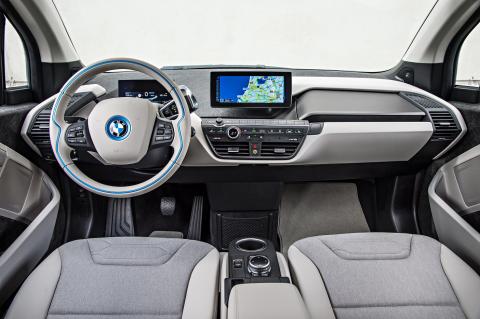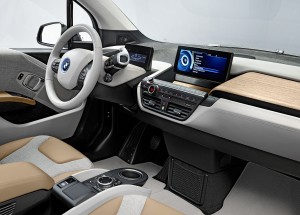
14 July 2014 - There are many facets to the sustainable character of the BMW i3. BMW i represents a prime example of “next premium”, the next generation of luxury headlined by the sustainability of its materials. The ambience this creates on board the BMW i3 can be experienced by the driver and passengers in considerable depth – and the international jury of experts for the Automotive Interiors Expo Award 2014 are now among its fans. The jury handed the electric-powered BMW i3 the title of Production Interior Vehicle Design of the Year. The third edition of these awards – which recognize exceptionally innovative concepts and solutions in the field of interior design – were held in June at the Automotive Interiors Expo in Stuttgart.
The selection and use of materials is central to the BMW i brand’s all-embracing sustainability concept. This applies on a large scale to the use of carbon-fibre-reinforced plastic (CFRP) in the passenger cells of BMW i cars and also comes into play in many details of their interior design. The hallmark LifeDrive architecture creates new scope for optimising the use of space on board the car and for the design of the interior. The colour and trim concept includes extremely extensive use of renewable raw and recycled materials, as well as wood and leather surfaces treated using environmentally sound methods.
The BMW i3 sets out to showcase sustainability through its design, as reflected by its cutting-edge, futuristic looks. The large, clear surfaces and bright ambience represent an expression of clean air and zero emissions. Large glass surfaces showcase the car’s lightweight design and lend the interior an airy, lounge-like character, while also offering the driver a better view over the road. Comfortable entry and a raised seating position are complemented both front and rear by exceptional freedom of movement thanks to an unbroken footwell extending across the full width of the interior.
The car’s innovative, exclusive aura is accentuated by signature BMW i design features and new materials, whose stand-out attributes are visible to the eye and palpable to the touch. 25 per cent (by weight) of the plastic used in the interior of the BMW i3 is recycled. The textiles selected for the seat surfaces are made entirely from recycled fibres, ensuring the surfaces display impressive naturalness and quality. The textiles for the roofliner, interior trim, boot lining, instrument panel and floor mats are likewise the product of a sustainable production process. The door trim panels of the BMW i3 are made from kenaf fibres, a plant from the mallow family whose natural structure remains recognizable after the treatment process. Eucalyptus wood from certified plantations in Europe provides the raw material for parts of the instrument panel, while the leather set aside for the interior of the BMW i3 is tanned in a natural process using extract of olive leaves.
This rigorous sustainability-focused selection of materials allows the design of the interior to play a major role in securing the BMW i3’s outstanding level of environmental compatibility. Moreover, it provides an immediate window into the all-embracing concept underpinning the world’s first premium car developed from the outset to be driven purely on electric power.
Bassoul-Heneine sal
Bassoul-Heneine sal is the exclusive importer of the BMW Group in Lebanon, and the oldest BMW importer in the world. Throughout its illustrious history, dating back to 1951 with the establishment of Bassoul-Heneine & Co., the company has built a wealth of expertise, knowledge and trust among its loyal customers desiring BMW and MINI automobiles.
For questions please contact:
Bassoul-Heneine sal
Email: nkhalife@bashen.com
Categories
- Log in to post comments
